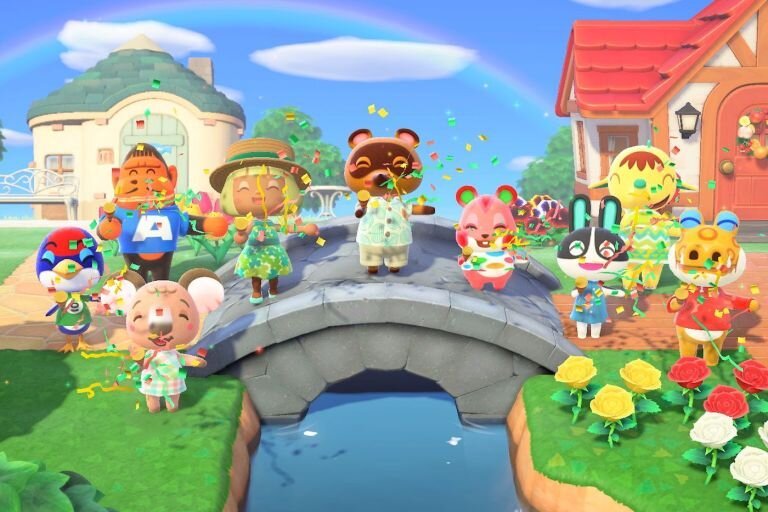
CAN THE LOCKDOWN GAMING BOOM SURVIVE?
Mara Dettmann
10/07/2020
Our day-to-day world may have shrunk during this pandemic, but virtual worlds have flourished. People in unprecedented numbers are embracing games like Animal Crossing, Minecraft, and Fortnite – and they’re using these platforms in refreshingly unexpected ways. Mara Dettmann shares how brands have gotten in on the action, and what we can expect in this space once lockdown measures reduce.
We’ve written before about the immense potential gaming offers, and why brands would be short-sighted to ignore it. And since the real world hasn’t exactly been hospitable these last months, it’s no surprise that people across markets are spending about twice as much time playing video games as they did before the pandemic hit – which means there’s a unique opportunity for brands and marketers.
Of the countless gaming platforms out there, three stand out in terms of new behaviors (human and branded): Animal Crossing, Minecraft, and Fortnite.
Animal Crossing – the breakout star of lockdown
Nintendo’s Animal Crossing has been around since 2001 (the graphics have somewhat improved since then).
The ultimate goal of the game is to survive (and ideally thrive) on a virtual island populated by animals – including ruthless raccoon landlord Tom Nook. But the joy of the game lies in the leisurely activities, from catching fish to building snowpeople.
Maybe because it’s relatively light on action, interest in the platform used to be relatively low compared to Fortnite and Minecraft. But it skyrocketed during lockdown:
And the fourth iteration of the game, New Horizons, sold 11 million copies in 11 days when it was released in March 2020.
The fact that you can invite real-life friends meant that people quickly started using Animal Crossing for virtual socialising – and for therapeutic reasons. Couples that couldn’t be together had virtual parties and dates; support groups organized meetings; and, given the complexities of arranging and attending funerals in lockdown, people are also memorializing loved ones on the platform.
In terms of entertainment, screenwriter Gary Whitta launched late-night talk show “Animal Talking” and there’s a growing live comedy scene with comedians like Jenny Yang.
More pragmatically, US Congresswoman Alexandria Ocasio-Cortez used Animal Crossing to canvas in a socially distant way.
It’s also been home to larger political gatherings: Hong Kong based protests on the platform led to China banning Animal Crossing.
Other events are actively encouraged – Global Pride, a consortium of LGBTQI+ groups, organised a virtual Pride parade.
It’s not surprising that with all the furor, brands quickly got on board. The first to make an impact on the platform were in the fashion sector: Valentino and Marc Jacobs both released Animal Crossing collections – digital clothes for players’ little avatars.
Next, brands with a physical location got in on the game. The UK’s Centre for Computing History unveiled its virtual version in April; Singaporean resort island Sentosa followed suit in May and even staged a wedding (disclaimer: this work was done by BBH Singapore).
More recently, fast food retailers have explored the potential of the platform – both Deliveroo and KFC tied in-game activations to real-life rewards like discount vouchers.
A downside to Animal Crossing? It’s almost distractingly immersive. One Japanese company tried to use Animal Crossing as a work from home platform – but since people can’t chat privately, can’t send files or images, and kept being distracted by the game itself, this experiment had to be abandoned. Creative agency Waste is trying a different approach by using the platform for recruiting rather than remote working.
Fortnite – exploring a gentler side
Before lockdown, I only really knew Fortnite as a virtual version of the Hunger Games where players fought to be the last person standing while introducing tween dance crazes like The Floss. Over lockdown, it’s turned down the harshness: the “Party Royale” mode lets players hang out, have fun, and listen to artists perform. So far, it’s worked spectacularly: 12 million players watched Travis Scott’s virtual concert in May.
Director Christopher Nolan seems to have a special interest in Fortnite: he premiered his new trailer for Tenet on the platform and let Fortnite screen his old films, which meant that even players who were physically apart could still watch together.
Minecraft – the education sensation
Though the average Minecraft player is actually 24 years old, the platform focused on its younger audience during lockdown. Working with the UN, Minecraft taught handwashing and social distancing skills to kids, and developed an education edition for children learning remotely with limited school support.
For players, Minecraft seems to be the most popular platform for virtual graduations across age groups. In one of the biggest events, a team of a hundred Berkeley students built “Blockeley University” for a ceremony attended by hundreds of students.
But Minecraft is also trying to become a virtual entertainment event hub: the platform has already hosted events like a Covid-19 relief festival and “‘Rave Family Block Fest” (again, note the focus on family) is coming up later in July.
Roblox – the dark horse
Roblox playtime (and spend on the platform – $100 million in May) have gone up as teens have been “using games to cope with the pandemic.” In the US, half of all children aged 9-12 now play Roblox every week where they log over 1.5 billion monthly hours.
Though there’s been fundraising in aid of Covid-19 relief and low-key Pride celebrations, no brand seems to have harnessed the potential of the platform so far. Roblox has been keeping a low profile during the pandemic, but it did make headlines when it was hacked by Trump supporters in late June – which could make brands less inclined to consider marketing on the platform.
What’s the secret to a successful gaming activation?
At this stage, most of the platform activations have been short-term stunts that earned a fair amount of trade and mainstream press coverage. It’s still unusual enough for brands to explore gaming that even if the end result is fairly banal (like arguably the fashion collections), the sheer novelty of it grabs attention and interest.
Since gaming is such a new space for brands, concrete case studies on ROMI are still under development. Burberry reported results of 2 million players in more than 40 countries for “B Bound,” its 2019 game, but with no information on how this impacted brand metrics. However: the fact that Burberry just continued its gaming strategy with a new (and more likely than not Animal Crossing inspired) activation suggests that it’s working for them.
Ultimately, the most interesting lockdown gaming activations are the ones uniquely ownable to the different brands as well as to the platforms. Organizing a virtual Pride on Fortnite wouldn’t have been a strong fit for how people actually use the platform, whereas the film screenings may not have worked as well on Animal Crossing.
This approach – unique to brand + tailored to platform = talkability – has also worked for Wendy’s. In 2019, the brand gained a lot of coverage for its highly ownable Fortnite stunt where a Wendy-inspired avatar shot freezers (because Wendy’s meat is never frozen).
Will the gaming boom continue now that more places across the world are reducing lockdown measures?
The need states that led to the uptake of online gaming in lockdown were, of course, unique. As Ian Bogost wrote about Animal Crossing for The Atlantic, “in the midst of a pandemic, it’s a delight to imagine doing whatever you like without worrying about making a living.”
However: we don’t expect the end of lockdown to bring about the end of gaming. Instead, the concentrated “home time” more likely accelerated an already ongoing adoption: “We have vaulted five years forward in consumer and business digital adoption in around eight years.”
Also, regardless of whether our behaviors “return to normal” or are irrevocably changed, the entertainment industry as a whole is still reeling from the immediate repercussions of the pandemic – which gives gaming a unique niche to fill.
Across markets, traditional summer entertainment venues (movie theaters, adventure parks) are still largely closed or operating at extremely limited capacity. And with film and TV production currently on hold, we genuinely risk running out of this more traditional home entertainment stream.
Though people have also been turning to other sources of entertainment (note a 54% increase in nostalgic Spotify playlists; Twitch viewership is up 31%; F1’s Virtual Grand Prix pulled in 3.2m viewers; and TikTok now has over 2 billion downloads), gaming is firmly in the 2020-and-beyond entertainment mix.
And since travelling to see far-away friends and family will continue to be challenging, the “virtual hang-out” aspect of platforms like Fortnite, Animal Crossing, and Minecraft will continue to be a unique benefit, especially if the alternative is laggy video chats.
Perhaps one of the most promising signs is that demand for virtual developers, designers, and event managers also continues to grow. Animal Crossing experts can earn more than $2k a month to create branded island experiences.
Ultimately, of course, it comes down to the players – and it seems like they’re here to stay. As Animal Crossing aficionada Kaity Kline writes for NPR, gaming is part of her life now: “I’m going to be coming back to this game a lot over the next few months to bring myself some peace and joy.”
TL;DR? Here’s a steal-and-share overview of the lockdown gaming boom in deck format.







